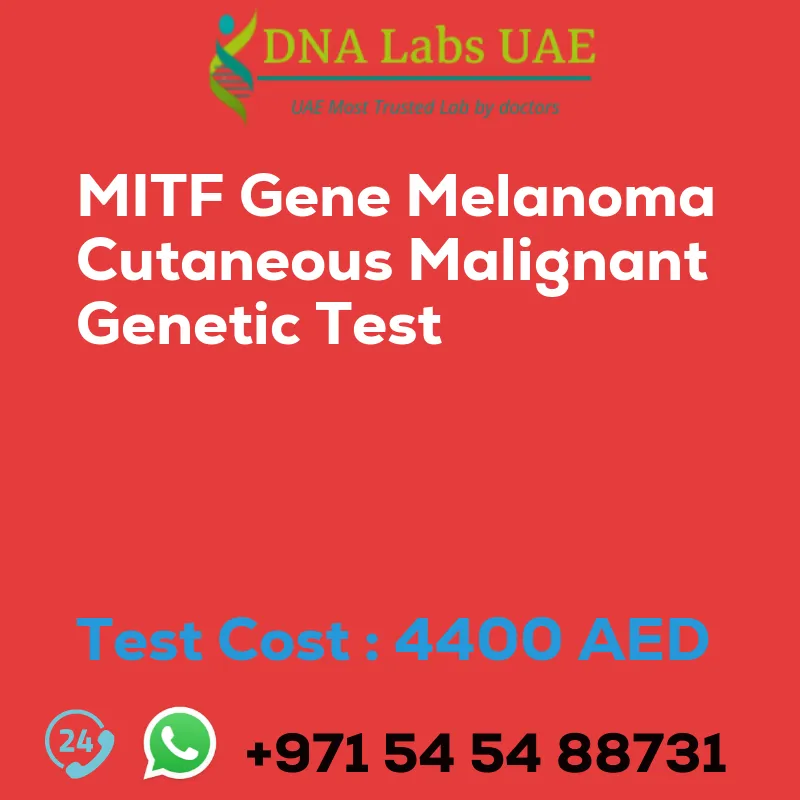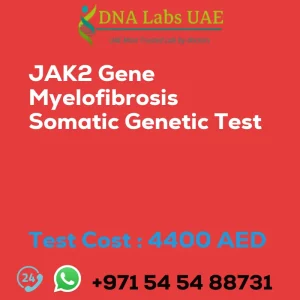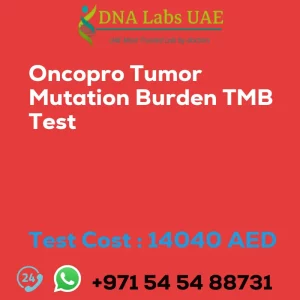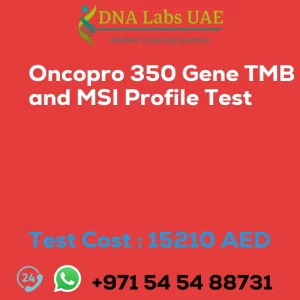MITF Gene Melanoma cutaneous malignant Genetic Test
Introduction
The MITF gene is a gene that plays a crucial role in the development and function of melanocytes, which are the pigment-producing cells in the skin. Mutations in the MITF gene have been associated with an increased risk of developing cutaneous malignant melanoma, which is the most aggressive form of skin cancer.
Test Details
Test Name: MITF Gene Melanoma cutaneous malignant Genetic Test
Components: Blood or Extracted DNA or One drop Blood on FTA Card
Price: 4400.0 AED
Report Delivery: 3 to 4 Weeks
Method: NGS Technology
Test Type: Cancer
Doctor: Oncologist
Test Department: Genetics
Pre Test Information: Clinical History of Patient who is going for MITF Gene Melanoma, cutaneous malignant NGS Genetic DNA Test. A Genetic Counselling session to draw a pedigree chart of family members affected with MITF Gene Melanoma, cutaneous malignant NGS Genetic DNA Test gene MITF.
Importance of Genetic Testing
NGS (Next-Generation Sequencing) genetic testing is a type of genetic test that uses advanced sequencing technology to analyze multiple genes simultaneously. In the context of cutaneous malignant melanoma, NGS genetic testing can be used to identify specific mutations or alterations in the MITF gene and other genes associated with melanoma.
NGS genetic testing for cutaneous malignant melanoma can provide valuable information about an individual’s genetic predisposition to the disease. This information can be used to guide personalized treatment decisions, such as determining the appropriate surveillance and screening strategies, identifying potential targeted therapies, and assessing the risk of developing other associated cancers.
It is important to note that genetic testing for cutaneous malignant melanoma is typically recommended for individuals with a strong family history of the disease or those who have multiple atypical moles or a personal history of melanoma. The decision to undergo genetic testing should be made in consultation with a healthcare professional or genetic counselor who can provide guidance and support throughout the testing process.
| Test Name | MITF Gene Melanoma cutaneous malignant Genetic Test |
|---|---|
| Components | |
| Price | 4400.0 AED |
| Sample Condition | Blood or Extracted DNA or One drop Blood on FTA Card |
| Report Delivery | 3 to 4 Weeks |
| Method | NGS Technology |
| Test type | Cancer |
| Doctor | Oncologist |
| Test Department: | Genetics |
| Pre Test Information | Clinical History of Patient who is going for MITF Gene Melanoma, cutaneous malignant NGS Genetic DNA Test. A Genetic Counselling session to draw a pedigree chart of family members affected with MITF Gene Melanoma, cutaneous malignant NGS Genetic DNA Test gene MITF |
| Test Details |
The MITF gene is a gene that plays a crucial role in the development and function of melanocytes, which are the pigment-producing cells in the skin. Mutations in the MITF gene have been associated with an increased risk of developing cutaneous malignant melanoma, which is the most aggressive form of skin cancer. NGS (Next-Generation Sequencing) genetic testing is a type of genetic test that uses advanced sequencing technology to analyze multiple genes simultaneously. In the context of cutaneous malignant melanoma, NGS genetic testing can be used to identify specific mutations or alterations in the MITF gene and other genes associated with melanoma. NGS genetic testing for cutaneous malignant melanoma can provide valuable information about an individual’s genetic predisposition to the disease. This information can be used to guide personalized treatment decisions, such as determining the appropriate surveillance and screening strategies, identifying potential targeted therapies, and assessing the risk of developing other associated cancers. It is important to note that genetic testing for cutaneous malignant melanoma is typically recommended for individuals with a strong family history of the disease or those who have multiple atypical moles or a personal history of melanoma. The decision to undergo genetic testing should be made in consultation with a healthcare professional or genetic counselor who can provide guidance and support throughout the testing process. |








